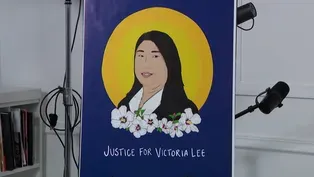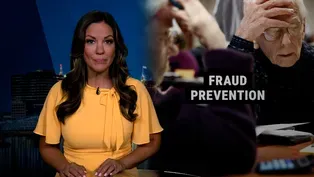NJ Spotlight News
NJ police have shot and killed 5 people this year
Clip: 8/19/2024 | 4m 55sVideo has Closed Captions
Another 12 people have died during other interactions with police.
Another 12 people have died during other interactions with police.
Problems with Closed Captions? Closed Captioning Feedback
Problems with Closed Captions? Closed Captioning Feedback
NJ Spotlight News is a local public television program presented by THIRTEEN PBS
NJ Spotlight News
NJ police have shot and killed 5 people this year
Clip: 8/19/2024 | 4m 55sVideo has Closed Captions
Another 12 people have died during other interactions with police.
Problems with Closed Captions? Closed Captioning Feedback
How to Watch NJ Spotlight News
NJ Spotlight News is available to stream on pbs.org and the free PBS App, available on iPhone, Apple TV, Android TV, Android smartphones, Amazon Fire TV, Amazon Fire Tablet, Roku, Samsung Smart TV, and Vizio.
Providing Support for PBS.org
Learn Moreabout PBS online sponsorshipThis incident is also putting renewed focus on the number of civilians who have been killed as a result of interactions with law enforcement.
Statewide data show new Jersey police have shot and killed five people so far in 2024.
It's fewer civilian deaths than at this time last year.
But the data also points out that two of those shot by police are believed to have been in mental distress.
An NJ spotlight News analysis dug deeper, looking at statistics for the last five years, and found 30% of fatal police shootings in the state were likely linked to a mental health crisis, prompting social justice advocates to call on law enforcement to do more to prevent these tragedies.
Senior writer Colleen O'Dea is with me now to share her reporting and why pinning down this data isn't so easy.
Colleen, you did a lot to get these numbers, including, going back through press releases from the attorney General's office.
Why don't they have this in a public database?
That is a really good question that I would love to get an answer to.
We did not get an answer to that question when we asked the attorney General's office.
So you can look at this, the use of force database that is available, which is a method of transparency, something that we've had for a few years now.
And you can see when there's been a gun shot, you can see whether a person has been arrested, but there's no it doesn't say gunshot deaths and for arrest.
What what has happened is if a person has died, then they're typically not arrested.
So you may often see gunshot, no arrest, but you can't be sure that that's the case.
Why not just come out and say it?
It's it it's mind boggling I don't know.
And so then, based on the numbers that you did find and you were able to analyze, what does it tell us about these incidents and specifically the ones that end tragically in a death?
Yeah, I mean, it's just there are a couple of ways that they're characterized.
You can have something that police would call a mental health incident, a welfare check.
Both of those are people you know, either saying or police finding out from someone that there may be a problem here.
And there are others, though, that we did characterize, not many, because we tried to be very cautious, but, I mean, I think an incident where someone is walking around town with a machete, that might come in as a police call for a disturbance, but it just certainly seems like an incident where there was likely a mental health issue happening there.
There are not really clear and fast rules for how some of these things are characterized.
So that leads to some fuzziness about how many.
I mean, there could be more than 30%.
And so then that begs the question about the training, because you made me think of a couple of the incidents you wrote about, you know, this incident in Fort Lee certainly is different than, a man where police were called.
He had a running chainsaw in his hands.
Right?
I mean, there are all different categories of the level of threat, both to public, to that person and to police.
But do police have the right tools at their disposal?
This is, of course, the question on everyone's mind.
I mean, I think the answer would have to be no.
there is some training that police have to go through.
it's it's not very long.
and I think we're still uncertain at this point whether it's something that has to happen every year, every five years, every ten years, or do you just go through it once?
I think that we are asking police to do an awful lot of things that maybe they didn't do 20 years ago, including be mental health experts.
And we have the arrive together program in the state.
Not every town has it.
Fort Lee, for instance.
The police were not part of that.
But, you know, certainly the folks that I've talked to have said that having a mental health professional come in and arrive with police or shortly thereafter is something that, you know, can help.
And there is data that shows new Jersey has helped to, prevent some of these, you know, terrible tragedies.
Yeah.
And does it make a bigger difference in, say, communities where there are more people of color?
Did your analysis show us anything about how they are affected?
I mean, it's certainly we our analysis shows that, yes, 40% of those who have been shot and killed by police were, black, African-American.
And that's way out of proportion with the population in the state.
whether those things would help, I mean, I certainly think that it's worth looking into in social justice advocates say that they absolutely these programs should be in place in communities, large communities of color to prevent these kinds of incidents.
all of the breakdown of your analysis is on our website in your article.
Colin OJ, thanks so much.
Thank you very much.
Bree.
Critics: Fort Lee police shooting videos are very troubling
Video has Closed Captions
'This family put a lot of trust in our systems to help her get care' (4m 48s)
Free vaccinations for uninsured children in Camden County
Video has Closed Captions
The service, via a mobile clinic, aims to help families catch up on routine immunizations (4m 32s)
How to protect yourself as more scammers target older adults
Video has Closed Captions
Interview: Chris Widelo, state director, AARP New Jersey (3m 59s)
Why Fed’s next move could shake up NJ housing market
Video has Closed Captions
If the Federal Reserve reduces interest rates in the fall, will inventory rise? (4m 9s)
Providing Support for PBS.org
Learn Moreabout PBS online sponsorshipSupport for PBS provided by:
NJ Spotlight News is a local public television program presented by THIRTEEN PBS















